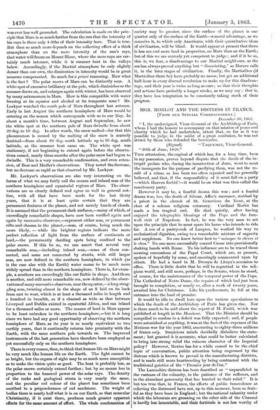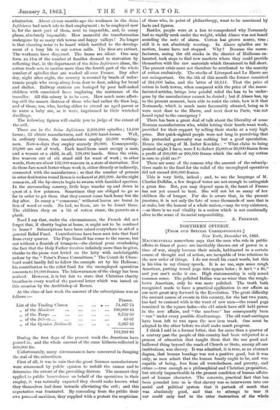MGR. MO RLOT AND THE DISTRESS IN FRANCE.
[FROM OUR SPECIAL CORRESPONDENT.]
December 30, 1862.
"I, the undersigned, Vicar-General of the Archbishop of Paris, whom I had the honour to accompany on that mission of peace and charity which he had undertaken, attest that, so far as it was possible to judge in the midst of a great confusion, he was not struck by those who defended the barricades.
(Signed) " TAQUEMET, Vicar-General. "20th of June, 1848."
Tars attestation, the orginal of which has, for a long time, been in my possession, proves beyond dispute that the death of the in- trepid prelate who, during the insurrection of June, went to meet the insurgents for the purpose of pacifying them, was not the re- sult of a crime, as has been too often repeated and too generally believed, and that, if the responsibility of it must fall on a party —which Heaven forbid !—it would be on what was then called the reactionary party.
However it may be, a fearful drama this was ; and a fearful drama was, too, the death of Sibour, Affre's successor, stabbed by a priest in the church of St. Genevieve du Mont, at the close of a solemn religious ceremony. Cardinal Morlot has made a less tragical end. He died quietly, after having enjoyed the telegraphic blessings of the Pope and the fare- well visit of Napoleon. In fact, he was the very man to act upon the principle that he must spare his horse who intends to ride far. A son of a pastrycook of Langres, he worked his way to ecclesiastical dignities, owing to a remarkable mixture of sagacity and suppleness. No one knew better how to " tne'nager la chevre et is chou." No one more successfully coaxed Cmsar into provisionally shaking hands with Rome. To his influence are to be traced those seeming concessions of the Papal Court, which are, at present, spoken of hopefully by some, and sneeringly commented upon by others. He had a hand in M. Drouyn de Lhuys's accession to office. There is little doubt that he will be regretted in the reli- gious world, and still more, perhaps, in the Senate, where he stood, of course, for the maintenance of the temporal power of the Pope. The Cathedral of Notre Dame, the repairs of which had just been brought to completion, or nearly so, after a work of twenty years, awaited him for Christmas. Like his predecessors, he fell at the entrance into the land of promise.
It would be idle to dwell here upon the various speculations to which the death of the Archbishop of Paris has given rise. Nor is there much to be said about the report of M. Fould, which was published at length in the Moniteur. That the Minister should be compelled to confess to a deficit was fully expected ; and, if people were astonished at anything, it was at the fact of the expenses of the Mexican war for the year 1862, amounting to eighty-three millions of francs only. Suspicious minds decidedly disbelieve the state- meat; but granted it is accurate, what could be better calculated to bring into strong relief the ruinous character of the Imperial policy? However, Mexico has for a while ceased to be the chief topic of conversation, public attention being engrossed by the distress which is known to prevail in the manufacturing districts, and is made still more heartrending by being contrasted with the traditional gaieties of the "Premier jour de Pan."
The Lancashire distress has been described as "unparalleled in
the vastness of the calamity, in the patience of the sufferers, and in the abundant generosity that haa hurried to their relief." It is but too true that, in France, the efforts of public benevolence at relieving the distressed have not, up to this moment, been so fruit- ful as they have been in England ; but the national calamity under which the labourers are groaning on the other side of the Channel is hardly leas lamentable, and their fortitude is not lees worthy of
admiration. About eleven months ago the workmen in the Seine Inferieure had much ado to find employment : to be employed now is, for the most part of them, next to impossible, and, in many places, absolutely impossible. How mournful the transformation undergone by so many rich towns and happy valleys ! No longer is that cheering noise to be heard which testified to the develop- ment of a busy life in our cotton mills. The fires are extinct. The workmen have dispersed. The looms are silent. One may form an idea of the number of families doomed to starvation by reflecting that, in the department of the Seine Inferieure alone, the cotton trade sets in motion more than the fourth part of the whole number of spindles that are worked all over France. Day after day, night after night, the country is scoured by bands of unfor- tunate people who creep along from door to door, asking for bread and shelter. Railway stations are besieged by poor half-naked children with emaciated faces imploring the assistance of the traveller. All this misery is to be seen. How much more affect- ing still the unseen distress of those who had rather die than beg, and of those, too, who, having either to attend an aged parent or to nurse a baby are, as it were, imprisoned in their wretched dwellings.
The following figures will enable you to judge of the extent of the evil.
There are in the Seine Inferieure 2,200,000 spindles ; 14,000 looms ; 32 chintz manufactures, and 64,000 hand-looms. Well, in ordinary times, the manufactures employ 50,000 working- men. Now-a-days they employ scarcely 20,000. Consequently, 30,000 are out of work. Each hand-loom must occupy a man, and a woman or a child, in all, 128,000 hands. Since the crisis, five weavers out of six stand still for want of work ; in other words, there are about 102,000 weavers in a state of starvation. Nor do those fare much better whose work is, either directly or indirectly, connected with the manufactures ; so that the number of persons in utter destitution round Rouen is reckoned at 260,000. As the night comes on, all the by-streets begin to swarm with famished spectres. In the surrounding country, little boys wander up and down in quest of a few potatoes. Sometimes they are obliged to go so far in order to get them that they cannot come back home but the day after. In many a "commune,' withered leaves are burnt in lieu of wood or coals. No bed, no liuen, are to be found there. The children sleep on a bit of rotten straw, the parents on a plank.
Need I say that, under the circumstances, the French did not forget that, if charity begins at home, it ought not to be confined to home ? Subscriptions have been raised everywhere in aid of a general Relief Fund. Contributions have been sent into that fund from every quarter. The Pope himself has come to the rescue, but not without a flourish of trumpets—the clerical press overlooking the fact that the Holy Father receives infinitely more than he gives, thanks to the pious rent levied on the laity with undefatigable ardour by the "Peter's Pence Committees." The Count de Cham- bord could hardly fail to follow the example set by his Holiness; his contribution to the relief fund for the unemployed operatives amounts to 10,000 francs. The lukewarmness of the clergy has been noticed. However, it is but fair to state that Christian charity breathes in every word of the pastoral letter which was issued on this occasion by the Archbishop of Rouen.
At the close of last week the amount of the subscriptions was as follows :—
Francs.
List of the Trading Classes 74,467.75 „ of the Moniieur ••• 100,00045 „ of the Temps ... 9,752.50 „ of the Debats 65.07 „ of the Opinion Nationale 3,267.45 192,924.85 During the first days of the present week the donations have poured in, and the whole amount of the stuns hitherto collected is 600,000 frs.
Unfortunately, many circumstances have concurred in damping the zeal of the subscribers.
First of all, it was in vain that the great Norman manufacturers were summoned by public opinion to unfold the causes and to determine the extent of the prevailing distress. The moment they applied to public benevolence on behalf of the operatives in their employ, it was naturally expected they should make known what they themselves had done towards alleviating the evil ; and this expectation was frustrated. By concealing from the public their own personal sacrifices, they supplied with a pretext the scepticism of those who, in point of philanthropy, want to be convinced by facts and figures.
Besides, people were at a loss to comprehend why Normandy had so rapidly sunk under the weight, whilst Alsace was not heard sounding the note of alarm. Cotton has grown scarce, true ; still it is not absolutely wanting. In Alsace spindles are in motion, looms have not stopped. Why? Because the manu- facturers, seeing the old stocks in the district of Mulhouse ex- hausted, took steps to find new markets where they could provide themselves with the raw materials which threatened to fall short. The present crisis must not therefore be attributed to the scarcity of cotton exclusively. The stocks of Liverpool and Le Havre are not unimportant. On the 5th of this month the former consisted of 264,000 bales, and the latter of 53,611. That the price of cotton in both towns, when compared with the price of the manu- factured articles, brings into painful relief the loss to be under- gone by the manufacturer cannot be denied ; but if Alsace has, up to the present moment, been able to resist the crisis, how is it that Normandy, which is much more favourably situated, being as it were next door to the Havre, and next door to Paris, was not found equal to the emergency ?
There has been a great deal of talk about the liberality of some Norman manufacturers who, whilst letting their hands want work, provided for their support by selling their stocks at a very high price. But quick-sighted people were not long in perceiving that this pretended generosity was nothing but a good speculation. Hence the saying of M. Imber Kcechliu : "What claim to being praised might I have, were I to deduct 25,000 or 30,000 francs from a profit of 200,000 or 300,000 francs which the sale of my cotton is sure to yield me?"
These are some of the reasons why the amount of the subscrip- tions made to the fund for the relief of the unemployed operatives did not exceed 600,000 francs.
This is very little, indeed ; and, to use the language of M. Charles Dolhfus, a few drops of water are not enough to extinguish a great fire. But, you may depend upon it, the heart of France has not yet ceased to beat. She will not let so many of her children die of hunger. For she is aware that, in the present juncture, it is not only the fate of some thousands of men that is at stake, but the honour of a whole nation,—nay its very existence, —as there is no real vitality in a nation which is not continually alive to the sense of its social responsibility.
A. FREEMAN.





























































 Previous page
Previous page